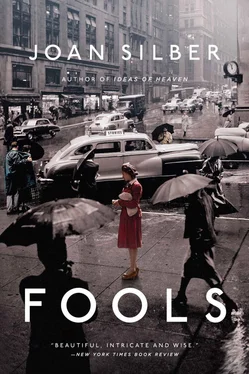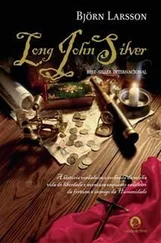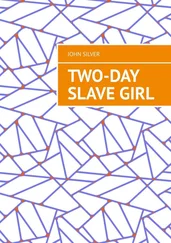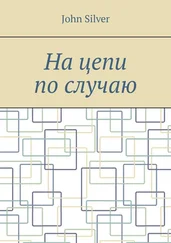“Very funny,” the guy said.
“I’m a riot,” Rudy said. And then he got up and left, lunkishly.
He thought, as he walked to the subway, that Liliane must find it complicated to be, essentially, a Muslim in disguise. If her wedding was in a mosque, she had to have converted. He knew that much. And then the woman had flown three and half thousand miles all the way to New Fucking York to hear the bigoted crap you heard on every corner now.
Liliane was cheered by one thing in New York, the prices were very good here. Not all the styles in shop windows were that nice, but she had learned to find her way through Bloomingdale’s and had picked up a perfect sundress and some wonderful voile shirts she bought in three colors. Her euros went far, and just because she’d lost money didn’t mean she didn’t have any . What to get for her son, Emile? He was remarkably indifferent to clothes. Ahmed was the only one who’d ever bought him anything he liked. He still wore an ancient, stretched-out alpaca turtleneck his stepfather had given him. Ahmed himself had a tendency to give away whatever you gifted him with. Liliane had seen a drummer onstage in the club wearing an Armani sports jacket she’d bought Ahmed for his birthday. Ahmed managed to not let her or anyone be insulted either — he was so jolly and righteous and certain.
Bloomingdale’s had absolutely nothing that Emile would like, but she bought herself a very pretty cuff bracelet, chunks of coral and turquoise set in brass. It cost more than she meant to pay, and once she had it in her shopping bag, she was cranky and morose and regretful. She kept it anyway, as if she were defying herself.
Later, before she went to bed, Liliane was very happy to see a text message on her phone from her son. The cheeses were going well, which meant he was selling enough so they didn’t all go bad. Emile’s ambitions were modest. He had a boyfriend who was an architect, not getting much work these days, but they didn’t live together, and Emile seemed to feel no pressure to earn more and be richer.
Liliane had always wanted to be richer, though she had stopped being a gold digger after a certain point. When was that point? It was after she ran off with cash from the American clarinet player, and it was not because she felt bad about him. What did he need money for? Just to drink himself to ruin.
How terrific she had looked then, in the clothes that were chic enough to get a better catch. The catch she drew was an affectionate and generous man in his forties, who was a vice president of Carrefour and was divorced from a much dumpier woman. He seemed delighted to be with someone like Liliane, beautiful and full of fun, and he was not the worst lover either. But he was used to certain habits of command. He liked to summon her to come to him at two in the morning, he liked to tell her what to wear when they went out, and he fell into a vile, ugly outburst in a taxi once after she’d disagreed with him in front of his friends. “Inequities of wealth erode civility,” her friend Yvette, who was a Marxist, said. To suffer indignities from a man you were crazy about was not unusual, even for Liliane, but to be maltreated by someone you didn’t love was degrading. She had expected much more triumph in the arrangement, which, in the end, did not suit her at all.
And so she had gone from one barely solvent boyfriend to another, until the big surprise of her pregnancy, but at least she’d liked these men. She hadn’t known she was any sort of purist, but it turned out she was.
Rudy waited for Liliane to call the next day, and she didn’t. She doesn’t hate you , he reminded himself, but maybe she did. He remembered a very odd look on her face when he hugged her good night. Oh, fuck , he thought — didn’t he know better than to go around hugging Muslim women? What was the matter with him? He’d been to Malaysia, Sumatra, and north India, where you didn’t even shake hands —what was the matter with him?
But the next morning, he wasn’t in his office for five minutes before Veena, his assistant, told him Liliane was on the phone. “You must to show me the real city, not only the expensive parts,” Liliane said.
“At your service,” he said. “Ready when you are.”
“The real city,” she said.
What does a person want most? Rudy had been trained to think about that when cultivating prospects. He thought that Liliane, who always looked so beautifully put together, so effortlessly splendid for her age, probably wanted admiration. Nobody wears satin pants and mascara just for herself. He could bring some guy friends with him, just to hover around her, but that would make the outing less official, and he had only so much time to make his pitch while she was here. What a weird profession. At his jobs for colleges, he’d helped make “gift charts” in pyramids of how many donations they needed in various sizes, but HH was more of a by-the-seat-of-your-pants operation. His research on Liliane’s assets had only shown a small French firm that moved property around, in a somewhat hyperactive way, and he was pretty sure there was more than that. The bad news was that there was no record of her giving big bucks — big euros — to any charity. Perhaps he would be her first. The one you never forget.
He didn’t even believe in charities. What people needed was justice, not handouts. He’d been raised by Leftists, he knew all that. But death was catching up with the lepers before India had enough free health care. Nothing could stop death, but coins could be thrown back at him to slow him down.
In Rudy’s club days as a teenager, he’d dated a girl who loved to come out of some venue at five in the morning, all spangled and sweaty and disheveled, and leave a twenty-dollar bill on the ground, for anyone on the street at that hour to find. It was something she liked to do before she went home, she thought it was lucky. Rudy, whose mother was starting to get sicker at this time, thought the girl didn’t know a fucking thing about luck, but then he started leaving bits of money too. He’d tuck it in a subway grating or a sidewalk crack, a five or a ten, and hear himself think to it, Please .
A modern NGO did not beg for donations by claiming they would bring luck, though all over the world people left offerings around statues for luck. He’d heard Deedee talk about “blessings,” but surely she knew not to say that to Liliane. It would not be good to get Liliane laughing in the wrong way.
Rudy had been thinking of Coney Island for their outing — funky, colorful, not too dangerous anymore — and was looking up its attractions on the computer at his desk at HH when Veena buzzed to tell him that Liliane was here — right here, now — in the office. This was a very good sign. Donors liked to think they owned the place, that it was theirs to pop in on.
But she was apologizing even as Veena showed her in. “You will think I am terrible,” she said. She was canceling their outing, to go instead to some country house upstate with her friend Barbara.
Surely she would stay for a minute and have a nice cool glass of iced tea?
Well, she might just do that.
“That’s so good, I need a break,” he said. “I’m getting grief from one of the centers about their roof that never gets fixed.”
“Yes, well, a roof.”
“I’d love to see the place fixed because a couple is going to get married there soon. Bamala and Pandi. They were engaged as children but then Bamala was thrown out of the village when she came down with leprosy. Years later they met again, by chance. It’s a great story.”
Didn’t he used to be better at this?
“It’s like a story out of a Bollywood movie,” he said. “Love lost and found.”
Читать дальше












